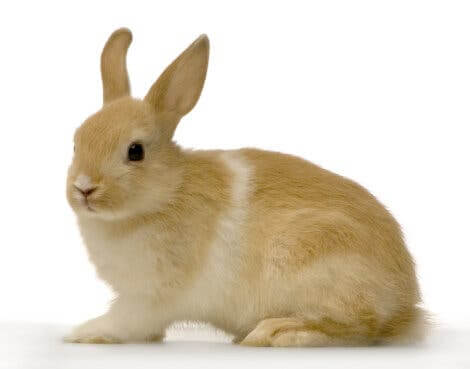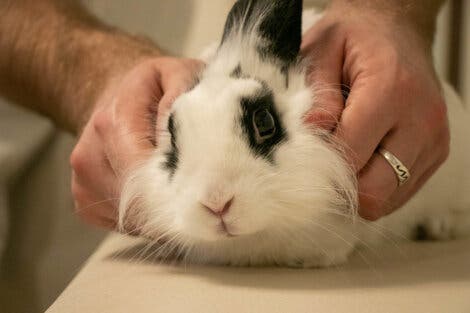All About Vestibular Disease in Rabbits


Written and verified by the vet Juan Pedro Vazquez Espeso
Rabbits are adorable little balls of fur, and it’s no surprise that they’re becoming increasingly popular household pets. However, they’re still living beings and they can suffer from certain diseases which are important to look out for. One of these is vestibular disease in rabbits.
This condition is so complex that sometimes it can be very difficult for vets to correctly diagnose it. Let’s go into a bit more detail.

Vestibular disease in rabbits
It’s one of the most common and studied neurological diseases that rabbits can suffer from. The vestibular system is a set of structures located in the ear that are responsible for maintaining balance.
This disease also happens in other species, like cats and dogs, but there are certain things about the condition in rabbits that make things slightly more complex.
Symptoms of vestibular disease in rabbits
As mentioned, it affects the parts of the ear that are responsible for a sense of balance and body position, so the symptoms mainly relate to this.
The condition can develop gradually or more suddenly depending on the cause. Since there are multiple potential causes, the symptoms can vary. Here are some of the most common:
- Torticollis: This is perhaps the most common symptom. You’ll see your rabbit tilting their head to the left or right, depending on the affected area.
- Loss of balance: You might notice that your rabbit has difficulties standing up or falls over more often. In advanced stages of the disease, your rabbit might find it completely impossible to stand at all.
- Problems walking: Your rabbit might be unable to walk in a straight line and may even walk in circles.
- Nystagmus: This is a common symptom and it involves the involuntary and repetitive movement of the eyes. You could say that it’s a bit like a twitch. It normally results in reduced vision and depth perception.

Causes of the disease
As we already mentioned, there are various potential causes for vestibular disease in rabbits. Below, we’ve listed the most common and most important:
- Encephalitozoon cuniculi: This is a common parasite in rabbits, and it can cause problems with the kidneys, eyes, or the nervous system. Furthermore, it causes acute encephalitis which leads to the symptoms of vestibular disease. Treatment involves anti-inflammatory and antiparasitic drugs.
- Pasteurella multocida: This is a bacterium that’s involved in the development of respiratory diseases in rabbits. It’s not usually serious, but on certain occasions it can migrate towards the ear, causing inflammation and leading to vestibular disease. To treat it, you’ll need powerful antibiotics, although in certain cases surgery may also be considered.
- Brain damage: Rabbits are quite delicate animals, especially when it comes to injuries. As a result, it’s quite common for a rabbit to suffer serious injuries after a blow or a fall that initially appeared insignificant. Depending on the degree and severity of the injury, your rabbit could develop vestibular symptoms as a consequence of a traumatic brain injury.
- Neoplasms: An abnormal tissue growth is one of the other possible causes. To find these tissues, your vet will need to use imaging techniques, such as an X-Rays, CT scans, or MRI.

So, what do you need to do?
As you can see, there are several possible causes for vestibular disease in rabbits, and they all need an early diagnosis to be sure that your rabbit is going to make a good recovery. So, as soon as you spot anything unusual about your rabbit’s behavior, make sure you take them to your vet as soon as possible for a check-up.
Rabbits are adorable little balls of fur, and it’s no surprise that they’re becoming increasingly popular household pets. However, they’re still living beings and they can suffer from certain diseases which are important to look out for. One of these is vestibular disease in rabbits.
This condition is so complex that sometimes it can be very difficult for vets to correctly diagnose it. Let’s go into a bit more detail.

Vestibular disease in rabbits
It’s one of the most common and studied neurological diseases that rabbits can suffer from. The vestibular system is a set of structures located in the ear that are responsible for maintaining balance.
This disease also happens in other species, like cats and dogs, but there are certain things about the condition in rabbits that make things slightly more complex.
Symptoms of vestibular disease in rabbits
As mentioned, it affects the parts of the ear that are responsible for a sense of balance and body position, so the symptoms mainly relate to this.
The condition can develop gradually or more suddenly depending on the cause. Since there are multiple potential causes, the symptoms can vary. Here are some of the most common:
- Torticollis: This is perhaps the most common symptom. You’ll see your rabbit tilting their head to the left or right, depending on the affected area.
- Loss of balance: You might notice that your rabbit has difficulties standing up or falls over more often. In advanced stages of the disease, your rabbit might find it completely impossible to stand at all.
- Problems walking: Your rabbit might be unable to walk in a straight line and may even walk in circles.
- Nystagmus: This is a common symptom and it involves the involuntary and repetitive movement of the eyes. You could say that it’s a bit like a twitch. It normally results in reduced vision and depth perception.

Causes of the disease
As we already mentioned, there are various potential causes for vestibular disease in rabbits. Below, we’ve listed the most common and most important:
- Encephalitozoon cuniculi: This is a common parasite in rabbits, and it can cause problems with the kidneys, eyes, or the nervous system. Furthermore, it causes acute encephalitis which leads to the symptoms of vestibular disease. Treatment involves anti-inflammatory and antiparasitic drugs.
- Pasteurella multocida: This is a bacterium that’s involved in the development of respiratory diseases in rabbits. It’s not usually serious, but on certain occasions it can migrate towards the ear, causing inflammation and leading to vestibular disease. To treat it, you’ll need powerful antibiotics, although in certain cases surgery may also be considered.
- Brain damage: Rabbits are quite delicate animals, especially when it comes to injuries. As a result, it’s quite common for a rabbit to suffer serious injuries after a blow or a fall that initially appeared insignificant. Depending on the degree and severity of the injury, your rabbit could develop vestibular symptoms as a consequence of a traumatic brain injury.
- Neoplasms: An abnormal tissue growth is one of the other possible causes. To find these tissues, your vet will need to use imaging techniques, such as an X-Rays, CT scans, or MRI.

So, what do you need to do?
As you can see, there are several possible causes for vestibular disease in rabbits, and they all need an early diagnosis to be sure that your rabbit is going to make a good recovery. So, as soon as you spot anything unusual about your rabbit’s behavior, make sure you take them to your vet as soon as possible for a check-up.
This text is provided for informational purposes only and does not replace consultation with a professional. If in doubt, consult your specialist.








